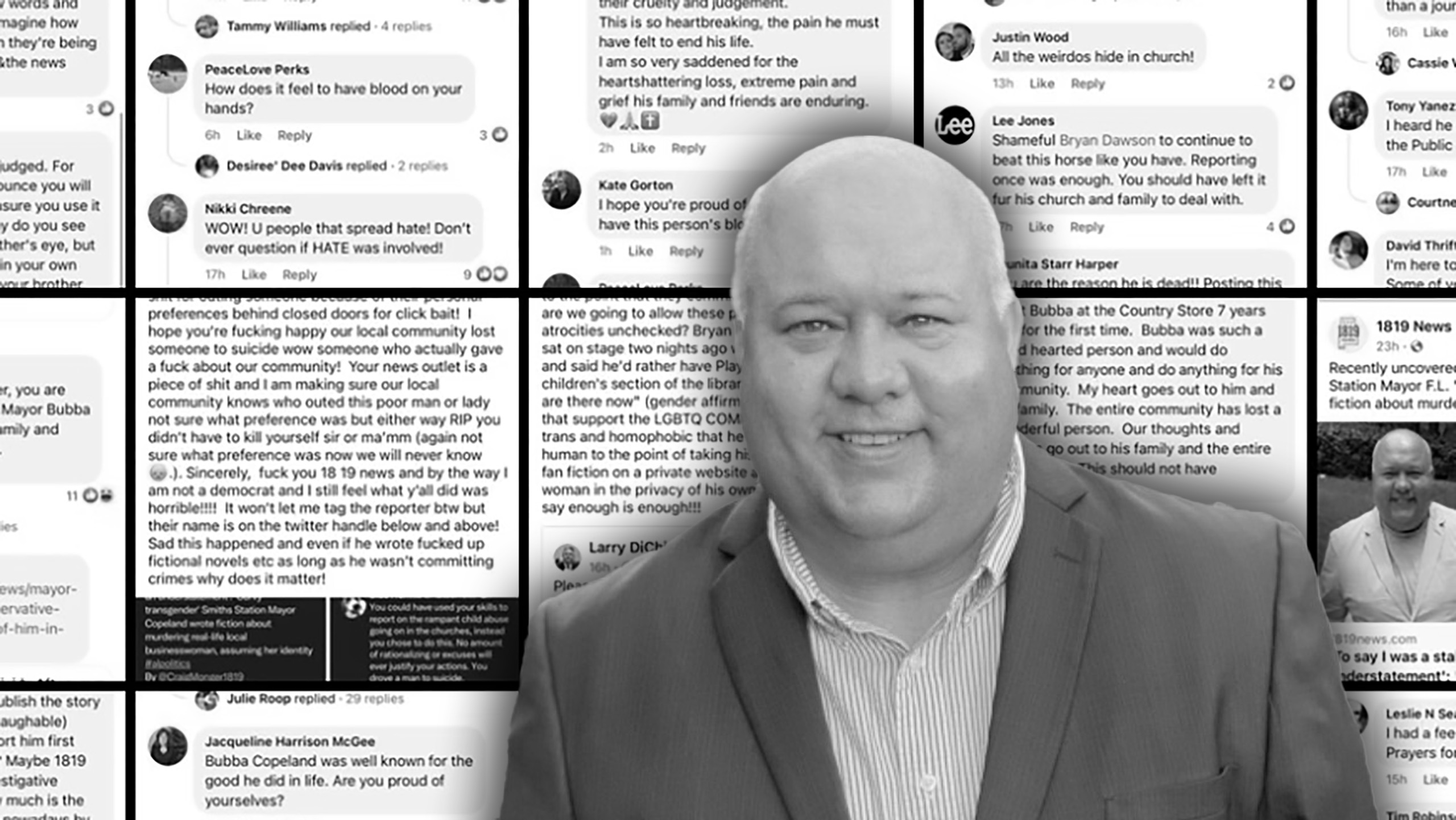|
Getting your Trinity Audio player ready...
|
In the quaint backdrop of Smiths Station, Alabama, the heavy heart of tragedy beats loudly, resonating through the threads of a community torn by a devastating incident that raises questions about journalistic integrity and the role of the press in modern society.
F.L. “Bubba” Copeland, once the city’s respected mayor and a pastor, sadly, is no more—another life dimmed prematurely. Copeland’s death has caused ripples of grief and outrage, not just for the loss of a community leader but for the actions that precipitated it. It stands as a somber moment to reflect on what we expect from our media institutions and where they should draw the line.
The media’s duty, in its purest form, is to hold the powerful accountable, to ensure that those who occupy public office adhere to their oaths, and to report on wrongdoing without fear or favor. However, the integrity of this duty is compromised when the media morph into moral adjudicators, keen on sensationalizing the personal lives of public figures to the point of persecution.
The case of 1819 News and their targeted exposé of Copeland’s personal life is a glaring example of crossing that sacred line. The conservative blog, with links to Alabama’s Republican political establishment, chose to unveil the private, consensual actions of Copeland—actions that took place within the sanctuary of his home, known and accepted by his wife, and hurting no one.
1819 News’ revelations about Copeland’s transgender identity were not of public concern; they were not actions of a public official abusing power or engaging in illegal activities. They were part of a private sphere that should have been respected. Instead, the news outlet’s decision to publish these intimate details seems less about journalistic integrity and more about enforcing a particular moral code—a code inherently subjective and not the purview of a news organization.
It is particularly disturbing that the person steering this narrative, Bryan Dawson, president and CEO of 1819 News, comes with his own checkered past. A convicted felon turned fundamentalist, one would assume his own journey might incline him to empathy, to understanding the complexities of human identity and the path to self-acceptance. Yet, under his leadership, 1819 News has demonstrated a brazen disregard for these nuances, seeking instead to brandish sensationalism under the guise of public interest.
Editor-in-chief Jeff Poor’s statement following Copeland’s death, offering thoughts and prayers while simultaneously hinting at further unproven allegations, is questionable at best. It continues a narrative that seems to seek justification for the unjustifiable, even in the face of profound loss.
Importantly, the financial engine behind 1819 News is especially notable since it holds a 501(c)(3) status. Its financial backers are a subject of legitimate public interest, particularly when its reporting style raises political and moral questions. Given the tax-exempt status of such an organization, it is funded ostensibly on the premise of providing a public good—often educational, literary, or informative in nature. The expectation is that such an entity operates to further the public interest, not personal vendettas or sensationalist agendas.
In the case of 1819 News, while its donors are not publicly listed, the organization’s ties with the Alabama Policy Institute and the reported involvement of notable conservative figures in its creation, such as former state senator Phil Williams and API’s then-president Caleb Crosby, give some indication of the kind of ideological framework from which it likely draws financial support.
The financiers, be they individual philanthropists, political action committees, or private foundations, may find strategic value in supporting a media outlet that aligns with their ideological stance. The profitability, in this sense, may not be monetary but rather political and social, serving as a mouthpiece to propagate a particular viewpoint or influence public opinion.
However, in the wake of the scandal involving the late Mayor Copeland, these benefactors might be scrutinizing the outlet’s approach. Whether they condone the brand of journalism that 1819 News has engaged in is a matter that would require their public comment. Their silence or vocal support would be equally telling.
The lack of transparency regarding donor identities does pose questions about accountability. If these individuals or entities are proud of the work 1819 News is doing, one would expect them to stand by their convictions publicly. Yet, there is a marked absence of such disclosures. This opacity could suggest a discomfort with the outlet’s methods or an awareness of the potential backlash that might follow public association with such tactics.
In the shadowed corridors of power and influence, those who finance 1819 News and similar organizations may prefer to remain unnamed, but in doing so, they contribute to a culture where transparency is undervalued. This dynamic has detrimental effects on public trust, particularly when the news outlet becomes the story itself due to questionable reporting practices.
As the Smiths Station community and wider circles debate the moral implications of 1819 News’ reporting on Mayor Copeland, the demand for transparency from the outlet and its backers grows louder. It is a fair expectation for the public to call for those who fund 1819 News to step into the light, just as they ask public officials to do. If the financiers of 1819 News believe in the mission and methods of the organization, they should have no qualms about attaching their names to its output.
In a society that values openness, the men and women who fund 1819 News should be prepared to own their part in the narrative created by their beneficiaries. After all, the pen, supported by the invisible hand of finance, can shape societies—but it can also divide them. As 1819 News continues its work, the call for donor transparency remains an unanswered, yet crucial question, for ensuring accountability and ethical journalism.
Copeland’s untimely death must not be in vain. It must serve as a clarion call for the media to introspect on its role in society. Yes, the press should zealously guard the truth, but it should not aim to destroy indiscriminately. A person’s private life, especially one that does not intersect with their public duties or infringe upon the rights of others, is not fodder for the news cycle.
The media has the power to influence society’s lens on morality, politics, and even life itself. With such power comes a profound responsibility to discern the public interest from morbid curiosity, to distinguish between accountability and vilification.
In Smiths Station, a community grieves not only for the loss of their mayor but for the loss of privacy, decency, and respect for individual dignity. Let this be the last time the boundaries of personal liberty are so carelessly trampled upon by those wielding the pen as a sword. The pursuit of truth must be tempered with humanity; anything less is a disservice to the principles of journalism and to the public it serves.














































